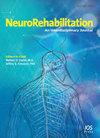Comorbid treatment of traumatic brain injury and mental health disorders
IF 1.8
4区 医学
Q3 CLINICAL NEUROLOGY
引用次数: 0
Abstract
BACKGROUND:The Emory Healthcare Veterans Program (EHVP) is a multidisciplinary intensive outpatient treatment program for post-9/11 veterans and service members with invisible wounds, including posttraumatic stress disorder (PTSD), traumatic brain injury (TBI), substance use disorders (SUD), and other anxiety- and depression-related disorders. OBJECTIVE:This article reviews the EHVP. METHODS:The different treatment tracks that provide integrated and comprehensive treatment are highlighted along with a review of the standard, adjunctive, and auxiliary services that complement individualized treatment plans. RESULTS:This review particularly emphasizes the adjunctive neurorehabilitation service offered to veterans and service members with a TBI history and the EVHP data that indicate large reductions in PTSD and depression symptoms across treatment tracks that are maintained across 12 months follow up. Finally, there is a discussion of possible suboptimal treatment response and the pilot programs related to different treatment augmentation strategies being deploying to ensure optimal treatment response for all. CONCLUSION:Published data indicate that the two-week intensive outpatient program is an effective treatment program for a variety of complex presentations of PTSD, TBI, SUD, and other anxiety- and depression-related disorders in veterans and active duty service members.创伤性脑损伤和精神疾病的合并治疗
背景:埃默里退伍军人医疗保健计划(EHVP)是一项多学科强化门诊治疗计划,针对 9/11 事件后的退伍军人和有隐形创伤的军人,包括创伤后应激障碍(PTSD)、创伤性脑损伤(TBI)、药物使用障碍(SUD)以及其他焦虑和抑郁相关障碍。目的:本文回顾了 EHVP。方法:文章重点介绍了提供综合全面治疗的不同治疗路径,以及补充个性化治疗计划的标准、辅助和辅助服务。结果:本综述特别强调了为有创伤性脑损伤病史的退伍军人和军人提供的辅助性神经康复服务,以及 EVHP 的数据,这些数据表明,在不同的治疗方案中,创伤后应激障碍和抑郁症状都有明显的减轻,并且在 12 个月的随访期间仍能保持。最后,还讨论了可能出现的次优治疗反应,以及与正在部署的不同治疗增强策略相关的试点项目,以确保所有人都能获得最佳治疗反应。结论:已发表的数据表明,为期两周的门诊强化治疗项目对退伍军人和现役军人的创伤后应激障碍、创伤后应激障碍、自发性精神障碍以及其他焦虑和抑郁相关障碍的各种复杂表现都是有效的治疗项目。
本文章由计算机程序翻译,如有差异,请以英文原文为准。
求助全文
约1分钟内获得全文
求助全文
来源期刊

NeuroRehabilitation
CLINICAL NEUROLOGY-REHABILITATION
CiteScore
3.20
自引率
0.00%
发文量
178
审稿时长
6-12 weeks
期刊介绍:
NeuroRehabilitation, an international, interdisciplinary, peer-reviewed journal, publishes manuscripts focused on scientifically based, practical information relevant to all aspects of neurologic rehabilitation. We publish unsolicited papers detailing original work/research that covers the full life span and range of neurological disabilities including stroke, spinal cord injury, traumatic brain injury, neuromuscular disease and other neurological disorders.
We also publish thematically organized issues that focus on specific clinical disorders, types of therapy and age groups. Proposals for thematic issues and suggestions for issue editors are welcomed.
 求助内容:
求助内容: 应助结果提醒方式:
应助结果提醒方式:


